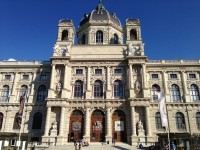On this Thanksgiving Day, I’m thinking of so many people in the country living in heightened fear as an aftermath of the recent election. People who have come to this country to escape atrocities in their home countries, or who have come seeking more opportunity for themselves and their families. People of color now fearing that there won’t be a protective net of the federal justice system when there are abuses of power by local police and courts. Women who fear that their right to control their bodies will be stripped away. And of course those who are unemployed or working numerous minimum wage jobs who fear that their struggles will be ignored by the people who used them for their votes, that there won’t be a push for greater income equality and a higher minimum wage. These people and others are on my mind this Thanksgiving day as all around the country people come together to give thanks for so much that many of us have.
With these people and others in mind, I thought that I would reblog portions of a previous blog where I have in mind a beautiful essay that Freud wrote nearly 100 years ago. Writing one year into World War I, as war waged, not in some far foreign land, but in Europe’s backyard, his backyard, Freud wrote about the war:
“It destroyed not only the beauty of the country sides through which it passed and the works of art which it met with on its path but it also shattered our pride in the achievements of our civilization, our admiration for many philosophers and artists and our hopes of a final triumph over the differences between nations and races. It tarnished the lofty impartiality of our science, it revealed our instincts in all their nakedness and let loose the evil spirits within us which we thought had been tamed forever by centuries of continuous education by the noblest minds. It made our country small again and made the rest of the world far remote. It robbed us of very much that we had loved, and showed us how ephemeral were many things that we had regarded as changeless.”
Having come out of the traumatic recent election cycle, which fueled divisions and divisiveness, his words ring clearly today, particularly about the “hopes of a final triumph over the differences between nations and races.” Psychotherapy, while acknowledging and indeed celebrating difference, also involves increasing one’s sense of oneself, or one’s nation or people, to include a greater appreciation for all that constitutes humanity.
Ever the European man, steeped in the enduring works of art, the believer in civilization, Freud ended his piece on an optimistic note. For so many today, it is difficult to be so optimistic. But I’ll quote him in the hopes that his words become true.
“When once the mourning is over, it will be found that our high opinion of the riches of civilization has lost nothing from our discovery of their fragility. We shall build up again all that war has destroyed, and perhaps on firmer ground and more lastingly than before.”


Comments are closed.